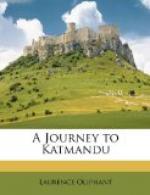It cannot but be regretted that with so pure an object he should be totally without co-operation from any quarter. The young King, capable only of aiding in nefarious schemes, such as those already recounted, can in no way comprehend the new-fangled philanthropic views of the prime minister: He cares little about the welfare of his country; his amusement seems to consist in concocting and executing bloody designs, and his mind must be so accustomed to this species of excitement that it can scarce do without it. It is unfortunate that the Rajah’s hobby should lie in this peculiar direction, more unfortunate still that the contemplated victim should be Jung; for I presume that there is little doubt that the King’s brother, who was engaged in the last conspiracy against the minister’s life—which took place a few days after my visit—must have acted with the knowledge, and most probably at the instigation, of his Majesty.
Nor can Jung look to his brothers for support as in times of old: one of them, whom he esteemed amongst the most faithful, was, as before mentioned, deeply implicated in the same attempt on his life; and there is no one now on whom he can confidently depend in the hour of need except the two youngest of the family, who accompanied him to England, and whom I consider thoroughly devoted to his interests. Deserted by his King, who owes his throne to him, his life conspired against by one of his own brothers, bound to him by the yet stronger ties of blood, he stands alone a mark for the dagger of any one who would win the approval of his degraded Sovereign. But his bearing is not the less bold, or his eye less piercing, as he makes the man quail before him who is that moment planning his destruction. He anticipates the fate of his fourteen predecessors; they were all assassinated! His predecessors, however, did not surround themselves with a guard armed with rifles always loaded. {121} In all probability the man who takes the life of the prime minister will do so at the price of his own. So securely guarded is he, and so careful of his own safety, that I cannot but hope he may live to frustrate the designs of his enemies, and to carry out that enlightened policy which, while it morally elevates the people, would develop the resources of a country possessing many natural advantages, in its delightful climate, fertile soil, and industrious population. Valleys unvisited by civilization save as received through the medium of a few semi-barbarous travellers, may contain treasures which they are now unknown to possess; mines of copper, lead, and antimony, now clumsily worked, may be made to yield of their abundance; tracts of uncultivated lands be brought into rich cultivation, and efficient means of transport would carry their produce far and wide through the country. Katmandu itself would be on the high road for the costly trade of Chinese Tartary and Thibet with the provinces of Upper India.
In fact it is impossible to enumerate the various benefits which would accrue to the country were a different system of government adopted; and it is much to be feared that unless the present prime minister lives to accomplish the task he has undertaken, no one of his successors, for some time to come at least, will have either the will or the ability requisite for its successful consummation.




